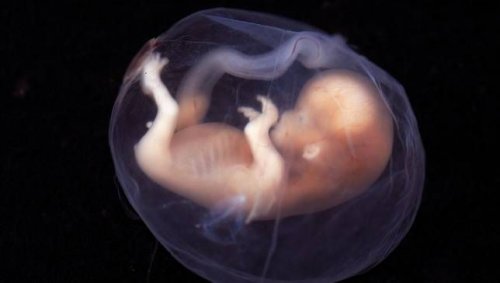The Thyroid Gland and Pregnancy: Are They Related?


Written and verified by the psychologist Valeria Sabater
The thyroid gland and pregnancy have a direct relationship that not many people know about. During pregnancy, a woman’s thyroid gland is “forced” to increase its thyroxine production by 30 to 50%. Its balance and good functioning will favor the correct development of the fetus’ brain and nervous system throughout the first trimester.
Sometimes it’s fascinating and frightening to discover how our glands and hormones mediate so much in our well-being. More often than not, a tiny imbalance is enough for us to perceive that some things aren’t going the way they’re supposed to. We gain or lose weight, we feel more tired or worse, and we may even have certain difficulties getting pregnant.
Irregularities in menstruation, fertility, and even the correct development of a pregnancy depend on that small butterfly-shaped gland located right under the Adam’s apple. It weighs only about 30 grams and is able to produce hormones such as triiodothyronine (T3) and thyroxine (T4), which have an immense impact on our health. Not only that, but they also play an important role in the proper development of a baby throughout the first months of gestation.

The importance of a key exchange between mother and child
The fetus’ thyroid gland develops between the 10th and 12th week of pregnancy. Until then, they will depend exclusively on their mother’s thyroid gland. This is a fact that it really relevant to this topic. If a woman has a clinical history of a thyroid disorder like hypothyroidism, many things could happen during her pregnancy.
Although women with hypothyroidism may have a harder time conceiving, it doesn’t mean that it’s impossible for them to get pregnant. However, the risk of abortion exists, as well as premature births or other medical problems such as preeclampsia (gestational hypertension).
The relationship between the thyroid gland and pregnancy is something that all women should keep in mind if they’d like to have a child. This explains why doctors always recommend thyroid function tests to be able to diagnose any small dysfunction that may cause major or short-term problems.
Hormonal changes during pregnancy
A normal pregnancy already involves alterations in the thyroid function. This is due to the influence of two very specific hormones: the human chorionic gonadotropin hormone (hCG), which is the one that pregnancy tests measure, and estrogen, the main female hormone.
The human chorionic gonadotropin hormone (hCG) acts as a stimulant for the thyroid gland. Its levels rise 2 or 3 days after conception and they stay that way about three months approximately. There are mothers who perceive this change in a more pronounced way (also known as false hyperthyroidism), to the point where they experience more nausea than normal, palpitations, and even weight loss.
On the other hand, once the second trimester arrives, other effects that also modify the function of the thyroid gland come into play. At this time, the hormones in charge are the female hormones themselves (estrogen). Between the 16th and 20th week of pregnancy, the level of TBG (thyroxine-binding globulin) doubles. This disorder is known as false hypothyroidism. However, if tests show that there’s no modification in T4 (thyroxine), then everything is okay.

Symptoms of hypothyroidism during pregnancy
Since the thyroid gland and pregnancy are deeply related, doctors tend to periodically monitor the pregnant woman’s thyroid panel throughout her pregnancy. In the case of an insufficient thyroxine production, the woman will be diagnosed with hypothyroidism. Here are some of the symptoms she may have:
- Weak nails and hair.
- Fatigue.
- Abnormal weight gain.
- Ongoing sensation of coldness.
- Muscle and joint pain.
- Dry skin.
- Digestive problems.
Keep in mind that a manifestation of a thyroid problem during pregnancy increases the risk of miscarriage and premature birth.
The odds of suffering from hyperthyroidism during pregnancy are relatively low. Here are some of the symptoms a woman can have if she starts suffering from hyperthyroidism during her pregnancy:
- Weight loss.
- Intestinal problems.
- Little to no heat tolerance.
- Discouragement and bad mood.
- Tremors.
- Insomnia.
- Goiter (swollen neck).
- Preeclampsia (hypertension and fluid retention).
On the other hand, if a woman suffers from hyperthyroidism during pregnancy and doesn’t treat it, she faces the risk of fetal death.

The thyroid gland and pregnancy: The importance of prevention
The relationship between the thyroid gland and pregnancy shouldn’t be a worrying factor as long as we get constant check-ups. These thyroid disorders are treatable and have a good prognosis for both the mother and the baby. Now, we recommend discussing the case with specialists if the woman has a family history associated with this disease and wishes to conceive.
Proper supervision based on regular check-ups, a healthy diet, and appropriate lifestyle habits will allow any woman to have a safe pregnancy.
The thyroid gland and pregnancy have a direct relationship that not many people know about. During pregnancy, a woman’s thyroid gland is “forced” to increase its thyroxine production by 30 to 50%. Its balance and good functioning will favor the correct development of the fetus’ brain and nervous system throughout the first trimester.
Sometimes it’s fascinating and frightening to discover how our glands and hormones mediate so much in our well-being. More often than not, a tiny imbalance is enough for us to perceive that some things aren’t going the way they’re supposed to. We gain or lose weight, we feel more tired or worse, and we may even have certain difficulties getting pregnant.
Irregularities in menstruation, fertility, and even the correct development of a pregnancy depend on that small butterfly-shaped gland located right under the Adam’s apple. It weighs only about 30 grams and is able to produce hormones such as triiodothyronine (T3) and thyroxine (T4), which have an immense impact on our health. Not only that, but they also play an important role in the proper development of a baby throughout the first months of gestation.

The importance of a key exchange between mother and child
The fetus’ thyroid gland develops between the 10th and 12th week of pregnancy. Until then, they will depend exclusively on their mother’s thyroid gland. This is a fact that it really relevant to this topic. If a woman has a clinical history of a thyroid disorder like hypothyroidism, many things could happen during her pregnancy.
Although women with hypothyroidism may have a harder time conceiving, it doesn’t mean that it’s impossible for them to get pregnant. However, the risk of abortion exists, as well as premature births or other medical problems such as preeclampsia (gestational hypertension).
The relationship between the thyroid gland and pregnancy is something that all women should keep in mind if they’d like to have a child. This explains why doctors always recommend thyroid function tests to be able to diagnose any small dysfunction that may cause major or short-term problems.
Hormonal changes during pregnancy
A normal pregnancy already involves alterations in the thyroid function. This is due to the influence of two very specific hormones: the human chorionic gonadotropin hormone (hCG), which is the one that pregnancy tests measure, and estrogen, the main female hormone.
The human chorionic gonadotropin hormone (hCG) acts as a stimulant for the thyroid gland. Its levels rise 2 or 3 days after conception and they stay that way about three months approximately. There are mothers who perceive this change in a more pronounced way (also known as false hyperthyroidism), to the point where they experience more nausea than normal, palpitations, and even weight loss.
On the other hand, once the second trimester arrives, other effects that also modify the function of the thyroid gland come into play. At this time, the hormones in charge are the female hormones themselves (estrogen). Between the 16th and 20th week of pregnancy, the level of TBG (thyroxine-binding globulin) doubles. This disorder is known as false hypothyroidism. However, if tests show that there’s no modification in T4 (thyroxine), then everything is okay.

Symptoms of hypothyroidism during pregnancy
Since the thyroid gland and pregnancy are deeply related, doctors tend to periodically monitor the pregnant woman’s thyroid panel throughout her pregnancy. In the case of an insufficient thyroxine production, the woman will be diagnosed with hypothyroidism. Here are some of the symptoms she may have:
- Weak nails and hair.
- Fatigue.
- Abnormal weight gain.
- Ongoing sensation of coldness.
- Muscle and joint pain.
- Dry skin.
- Digestive problems.
Keep in mind that a manifestation of a thyroid problem during pregnancy increases the risk of miscarriage and premature birth.
The odds of suffering from hyperthyroidism during pregnancy are relatively low. Here are some of the symptoms a woman can have if she starts suffering from hyperthyroidism during her pregnancy:
- Weight loss.
- Intestinal problems.
- Little to no heat tolerance.
- Discouragement and bad mood.
- Tremors.
- Insomnia.
- Goiter (swollen neck).
- Preeclampsia (hypertension and fluid retention).
On the other hand, if a woman suffers from hyperthyroidism during pregnancy and doesn’t treat it, she faces the risk of fetal death.

The thyroid gland and pregnancy: The importance of prevention
The relationship between the thyroid gland and pregnancy shouldn’t be a worrying factor as long as we get constant check-ups. These thyroid disorders are treatable and have a good prognosis for both the mother and the baby. Now, we recommend discussing the case with specialists if the woman has a family history associated with this disease and wishes to conceive.
Proper supervision based on regular check-ups, a healthy diet, and appropriate lifestyle habits will allow any woman to have a safe pregnancy.
This text is provided for informational purposes only and does not replace consultation with a professional. If in doubt, consult your specialist.







